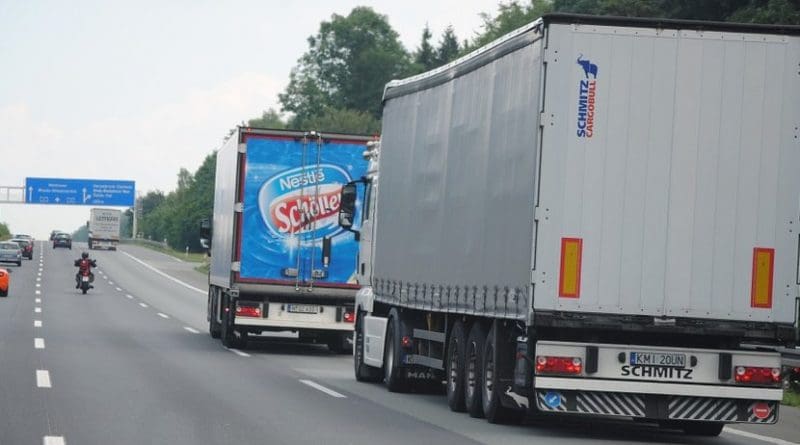Truckers Count Costs After First Week Of Post-Brexit Border Regime
By EurActiv
By Benjamin Fox
(EurActiv) — Hauliers are already counting the cost of the new post-Brexit border rules after the first week of life with the UK outside the EU’s single market saw truck queues, delays, and supply chain disruptions.
The Road Haulage Association (RHA), an industry lobby group, called on Friday (8 January) on the UK and Irish government to relax some of the new Irish Sea trade border rules, under which goods transiting from Great Britain to Northern Ireland and the Republic are subject to customs checks.
“The problems have led to gaps in supermarket shelves and lorries delayed at ports because of problems with red-tape and the situation is worsening,” said the RHA, adding that “we are facing an inflexible, cumbersome and time consuming process just to move goods.”
With cross-border travel having been halted by the COVID-19 pandemic, trucks and lorries are at the front-line of the new post-Brexit trading world. There has, as yet, not been a repeat of the lengthy delays in December after the French government closed the border in a bid to contain the spread of the pandemic.
Meanwhile, the UK’s Freight Reservation Service warned that they were “experiencing a high volume of vehicles being refused and delayed at the Ports of Calais, Dunkerque and Dover, due to incorrect paperwork being presented at check-in.”
The costs of freight transport have also increased. Spot rates for last-minute shipments across the Channel reached €6 per kilometre for a full truckload at the end of 2020, compared with a usual average of €1.50-3, according to global logistics platform Transporeon.
The trade pact agreed by Prime Minister Boris Johnson and the EU on Christmas Eve guarantees tariff and quota-free trade in goods but goods imported into the EU will need to be subject to “customs formalities” and regulatory checks.
There are disagreements over how many vehicles have been turned away from the border points for having the wrong paperwork.
The UK’s Department for Transport said that at least 90% of lorries trying make the Dover-Calais crossing had the correct paperwork in the first week of the new EU-UK trade relationship, while the Road Haulage Association (RHA) told BBC News that about one in five trucks were being turned away.
On the UK side, it is now mandatory for all heavy goods vehicles using the Short Strait channel crossings to obtain a digital Kent Access Permit.
The UK government launched an information campaign preparing hauliers for the new customs procedures back in October and is spending £705 million (€800m) on new infrastructure at its ports and border points to help smooth the flow of traffic.
Governments in London and Paris have both set up a number of funding schemes to help businesses manage the paperwork and the costs.
While EU and UK negotiators agreed on an adaptation period for the most heavily burdensome procedures for trade across the Irish Sea, Katy Hayward, Senior Fellow at the UK in a Changing Europe academic think-tank, said that “it is striking how few friction-reducing measures there are in the TCA for the movement of goods from GB into the EU.”
The “lack of mitigations does not mean that the rules will be generously interpreted or loosely applied. Rather, it means that too many attempting to move goods from GB into the EU will not be ready to meet them,” Hayward added.

